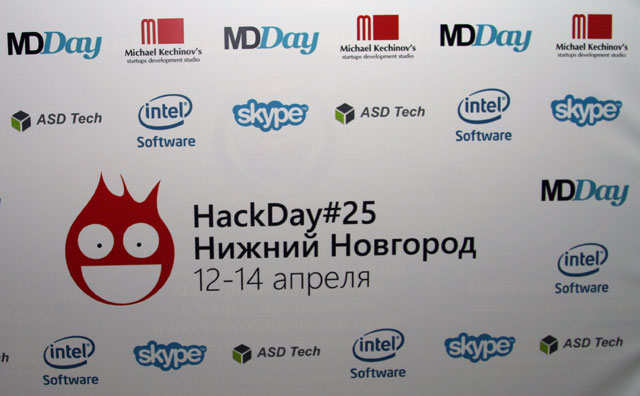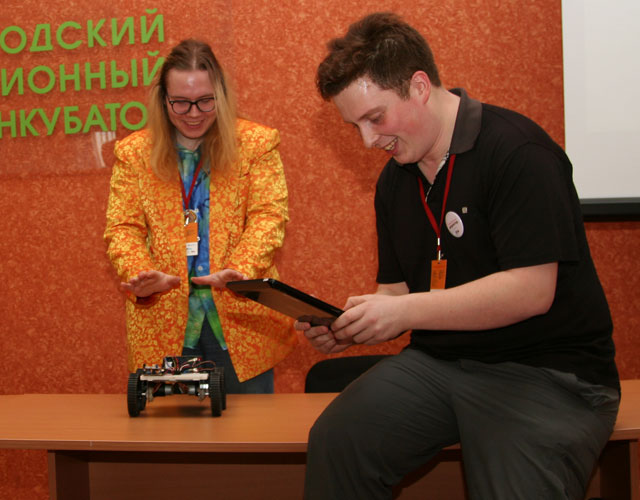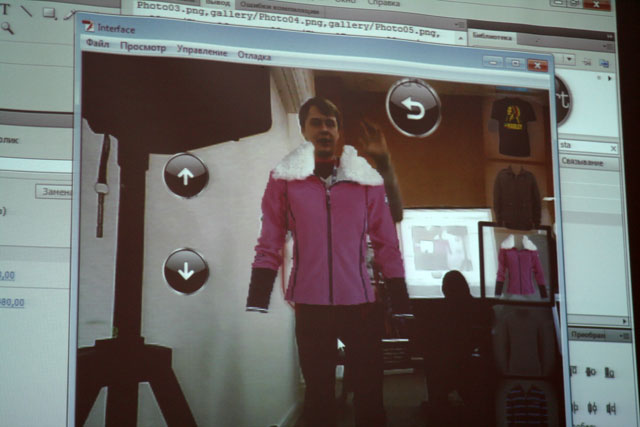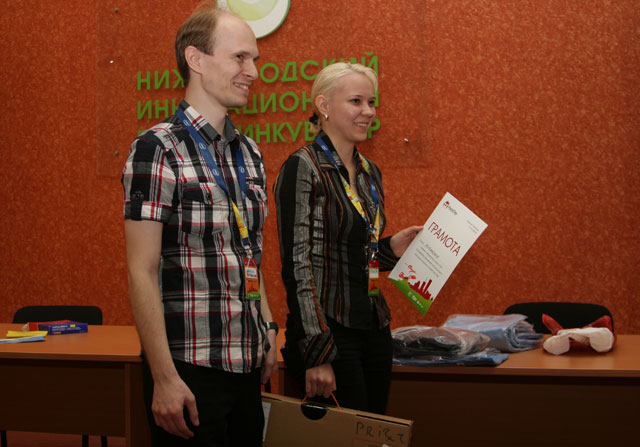HackDay # 25 in Nizhny Novgorod - now with the competition of Intel

From April 12 to April 14, the next, 25th, HackDay Developer Contest was held in Nizhny Novgorod. In two working days, which are holidays for all other people, the participants had to translate the idea that they had invented or immediately came up into a more or less workable project. The difference between this iteration of HackDay and the previous ones was that Intel arranged something like a “competition in the competition” and invited programmers to try their hand at creating applications on the Perceptual SDK. The winner of the competition was waiting for a good prize - an ultrabook. Well, now a small report on how everything was.
So, for two days (and two nights - as you wish), the cozy, though not very well located, premises of the Nizhny Novgorod business incubator CLEVER were provided for unlimited, I would even say, unlimited creativity. It all started on Friday evening with the participants presenting their projects in the format of a short pitch-performance. At this formalities were completed and the work process began directly. Of the 24 projects registered on the site, 19 went to work - a good indicator. Looking ahead, I will say that we got to the finish line 15 - also nothing.

The procedure for launching the robot using shamanism
The teams went to work rooms. Intel has provided everything necessary for its competition: specialists who are ready to provide advice and equipment (cameras, laptops). Software development was interrupted by check-points - small working meetings with the announcement of current results. In addition, mentor sessions were held - discussions of ongoing projects with experts. Like any creative process, the development went on with excitement and a little nervously: what didn’t work out exactly, something didn’t work at all ... and all this in the fight against sleep and constantly buggy Wi-Fi.
')

Demonstration of virtual midi keyboard
By Sunday evening, the main work was already completed. Someone could not stand the pace or was disappointed in his idea and left the competition, but the majority in the state of varying degrees of zombie gathered for a demo fest and award. Demo fest - presentation of a product made in two days. Products turned out different; some were not at all impressive, others, on the contrary, looked very dignified. Enumerate those that I liked personally.

Virtual fitting room. PercSDK could also be used here, but technical limitations prevented
Firstly, this is a delivering implementation for Android to the well-known folk game "Crocodile" (this project has rightly received a prize). Secondly, the brain-breaking toy “Mobl” is also a competition winner. The idea of a motivating Internet wake-up Wakeupzzz seemed to be an interesting life hacking - you have to think about making money bets for getting up on time. The creators of a wheeled robot controlled from a tablet via Wi-Fi lit up the demo fest from the bottom of their hearts - even musical instruments were used to fight the office wireless network. And the human mind won - as a result, the robot still went.

Intel Contest Winners with Literacy and Ultrabook
In an Intel contest, two projects reached the demo fest. One is to control the virtual midi keyboard with your fingers, like one of the winners of the Intel Perceptual Computing Challenge demonstrated.
The developers themselves admitted that they took up the project from a purely academic interest - to try what PercSDK is. Well, the winners of the competition were Alexey Veselovsky and Nadezhda Lebedeva with Virtualens software, which makes it possible to artificially blur the background of a video broadcast, leaving only the face of the person sitting in front of the camera in focus. They received the main prize - ultrabook from Intel. By the way, Alexey published in his blog a detailed report on his participation in HackDay - you can read the story in the first person .
Video showing the work of the program Virtualens
After the contest, Intel expert Artem Vorobyev shared his opinion on the submitted projects.
Both applications made, in general, a good impression. Participants were able to set realistic tasks for themselves and complete them within 48 hours.
VirtuaLens implemented two main features: blurring the background and adjusting the focal plane using the Big5 gesture. The application works relatively stably, however, a number of improvements are needed for product quality. In particular, you need to implement a smoother contour between areas of clear and blurred images.
As for the midi-controller, I would like to try it live, in order to evaluate how comfortable it is. However, at the presentation the application was fully functional. The application has implemented the function of switching tools with swipes left / right. It may be worthwhile to switch tools in another way, because waving your arms in front of the camera led to false keystrokes. Also, it is probably worth completing the application to a full-featured software synthesizer that does not use a third-party product.
The final events ended late in the evening. Everyone was going out tired but satisfied. The next HackDay will be held in less than a month in Kazakhstan, in the city of Almaty - but without Intel.
Source: https://habr.com/ru/post/176985/
All Articles